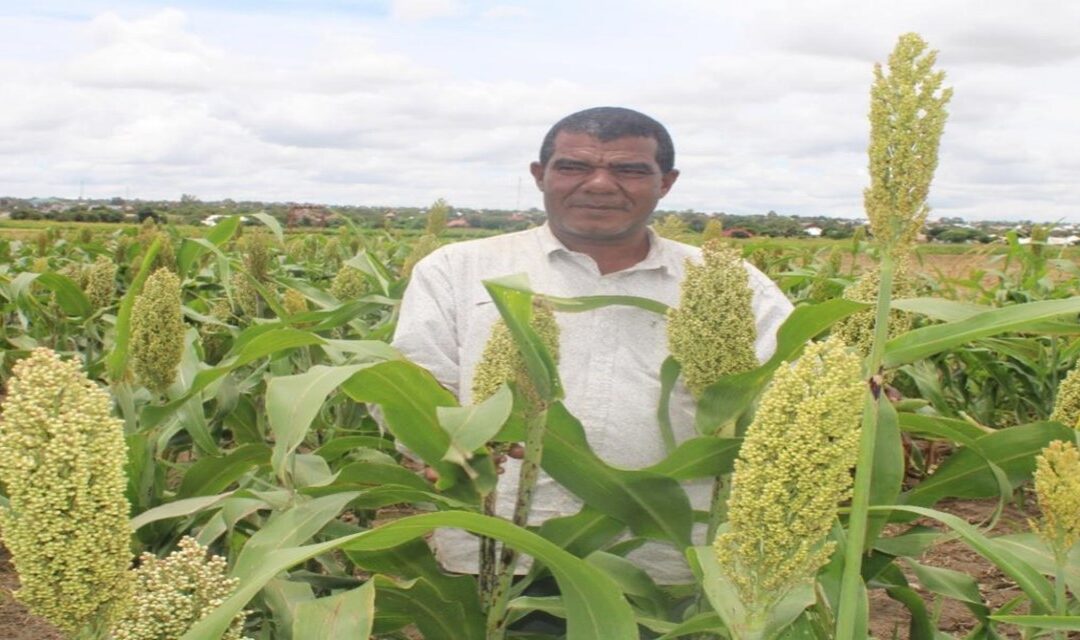Authors
Atupokile Mwakatwila1*, Justus Ochieng1, Radegunda Kessy1, Sylvia Kalemera1, Devotha Mchau2, Emmanuel Mwenda3, Anthony Bujiku4, Gerald Alex4, Yohane Chideya1, Christopher Ochieng Ojiewo5, Jean Claude Rubyogo1
1 The Alliance of Bioversity International and CIAT
2 Tanzania Agricultural Research Institute (TARI), Makutupora, Dodoma Tanzania.
3 TARI, Ilonga, Tanzania.
4 TARI, Naliendele, Tanzania.
5 International Maize and Wheat Improvement Center (CIMMYT).
Corresponding author: a.mwakatwila@cgiar.org
Background Information
Kibaigwa Flour Supplies Ltd (KFS), located in the heart of Dodoma Region’s Kongwa District, is a crucial grain trader and processor. Specializing in sorghum, maize, groundnuts, and sunflower, KFS sources these crops from thousands of smallholder farmers in Kongwa, Mpwapwa, and Chamwino within the region, as well as in Samanjiro and Kiteto in Manyara Region, and Njombe District in Njombe Region. Owned by Sebastian Msola, KFS also produces a variety of fortified flours, including sifted maize flour, mixed maize, sorghum, cassava flour, and multi-vitamin flour, locally known as Toto, Family, and Mama. The company serves both domestic and international markets, including Rwanda, Burundi, and Kenya.
For decades, Tanzania has faced significant challenges in cultivating open-pollinated varieties (OPVs) of crops like sorghum, maize, groundnuts, and sunflower. Farmers in the East African nation often lack awareness and knowledge about the benefits and management practices of OPVs. Furthermore, the limited supply of high-quality OPV seeds has hindered widespread adoption among farmers. Additionally, market demand for OPVs is low, as consumers and processors prefer the uniformity and high quality of hybrid varieties.
Thanks to the Accelerated Varietal Turnover for open pollinated crops project (ACCELERATE), these challenges are being effectively addressed. Supported by the Bill & Melinda Gates Foundation (BMGF) and led by the Alliance of Bioversity International and CIAT, the initiative is extending the Pan-Africa Bean Research Alliance’s (PABRA) model, known as the “Bean Corridor Approach” is being extended to sorghum and groundnuts. The project is jointly implemented by with Tanzania Agricultural Research Institute (TARI), Tanzania Official Seed Certification Institute (TOSCI), and International Maize and Wheat Improvement Center (CIMMYT). This strategic model, designed to enhance the efficiency and effectiveness of bean production and distribution, emphasizes strong partnerships from breeding to seed delivery, all aimed at meeting market demands.
Among other specifics, the project addresses the critical needs of traders—buyers who purchase large quantities of grains by ensuring that the produced varieties have a guaranteed market. By centering the business around traders, the model facilitates rapid seed multiplication and improved access to enhanced varieties for many farmers. This initiative enabled the project to engage with KFS and introduce new sorghum and groundnut varieties, all released within the past 10 years.
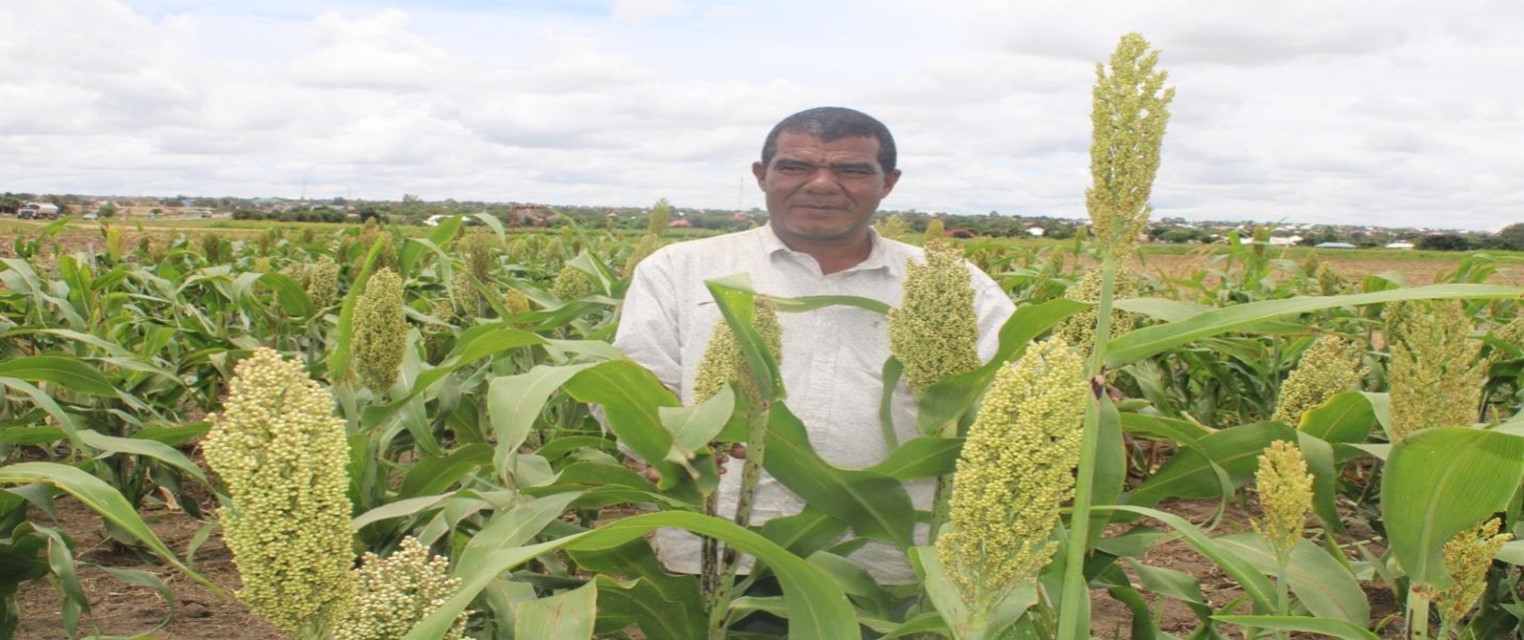
Mr. Msola, the Managing Director of KFS, in one of the sorghum demonstration fields in Kibaigwa village, Kongwa District
Supporting small-scale farmer-led businesses
To ensure the success of this model, KFS fosters robust relationships with local farmers, primarily engaging them on a contract basis. This approach involves providing seeds on credit and offering training in Good Agricultural Practices (GAP) for the four key crops. After harvest, KFS also purchases the produce, supporting 7,850 farmers, including 3,400 contracted farmers. This collaboration guarantees a steady supply of high-quality crops for KFS and empowers farmers with the resources and knowledge they need to thrive.
Farmers in Kongwa District, particularly those cultivating sorghum and groundnuts, are delighted with KFS’s presence, as it guarantees them a reliable market for their crops. KFS offers competitive prices for their produce, surpassing many other buyers, most of whom are middlemen. For instance, during the 2022/2023 season, KFS purchased sorghum at TZS 550 per kilogram, whereas other buyers were offering TZS 480 per kilogram.
Hilda Madeje, a lead farmer and proud member of the Kazania farmers’ group in Sagara village, Kongwa District, shares her appreciation for the Accelerate project team. She also expresses how working with KFS has been a game-changer for her economic growth. Hilda highlighted the company’s role as a reliable buyer, offering competitive prices for crops and providing a stable market for sorghum and groundnut farmers in Kongwa. This partnership has not only benefited individual farmers like Hilda but has also accelerated economic growth across the community.
“This arrangement has helped me immensely. I have been farming for a long time without anything tangible to show for it, but since I started doing business with KFS, my life has significantly improved. I now sell my crops at a good price, and the market is reliable throughout the year. I have been able to pay school fees for my children, build a house, and open a small shop in my village. This shop helps me meet household needs and purchase food items that I don’t grow, like rice, ensuring we have well-diversified meals,” she says.
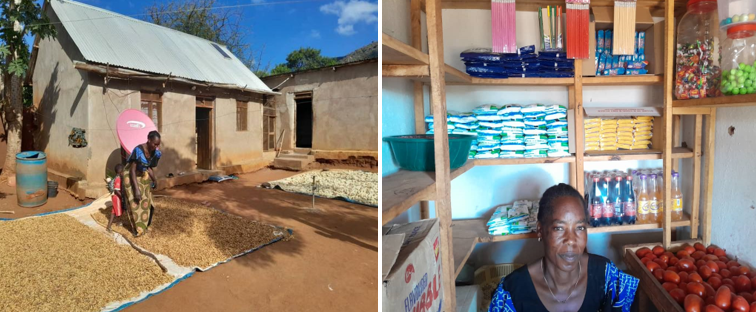
Ms. Hilda showing some of her farm produce at her home and the shop she opened in her village
Photo credit: CIAT/PABRA
Establishing of demo plots
This initiative not only showcases agricultural innovation but also empowers local communities, fostering a spirit of collaboration and progress. The introduction of new, improved, and cutting-edge sorghum varieties through this project aims to significantly enhance agricultural productivity and sustainability in the region. The new sorghum varieties, TARI SOR 1 and TARI SOR 2, along with advanced groundnut varieties, NARINUT 2015 and NALIENDELE 2016, captivated KFS, leading to the establishment of 16 vibrant demonstration plots by both group and individual farmers across Kongwa and Chamwino Districts (Table 1). Among the pioneers, the Nazareth farmers’ group, with 31 dedicated members (21 women and 10 men), planted the promising TARI SOR 1. Meanwhile, the Kazania group, consisting of 13 women and 2 men, embraced the groundnut varieties NARINUT 2015 and NALIENDELE 2016.
Table 1: List of sorghum old varieties being produced by farmers working with KFS versus newly promoted varieties
|
Old varieties (more than 10 years |
Year of release |
New varieties |
Year of Release |
Advantages of new varieties |
|
Macia |
1998 |
TARI SOR 2 |
2021 |
White High yield 3-4tons/Ha Striga and bird resistance |
|
NACO Mtama 1 |
2012 |
|||
|
Tegemeo |
1978 |
|||
|
Serena |
1960 |
TARI SOR 1 |
2021 |
Red High yield 3-4tons/Ha Striga and bird resistance |
In Dodoma Region, for instance farmers traditionally grow very old groundnut varieties introduced in 1945, known as “Kongwa Nyeupe,” “Kongwa Nyekundu,” “Mabunga,” and “Merika,” alongside ancient sorghum varieties “Lugugu” and “Igwana.” (Table 2). These legacy varieties have limited performance in terms of yield, pest and disease resistance, and climate adaptability.
Table 2: List of groundnuts old varieties being produced by farmers working with KFS versus newly promoted varieties
| Old varieties (more than 10 years | Year of release | New varieties | Year of Release | Advantages of new varieties |
| Kongwa Nyekundu | Local* | NALIENDELE 2016 | 2018 |
Red, Average yield 1-2tons/ha Rosette resistance |
| Kongwa Nyeupe | Local* | NARINUT 2015 | 2015 |
Tan colored, large seeded Average yield 1.2-2tons/ha Rosette resistance |
| Mabunga | Local | |||
| Merika | 1970’s |
*These varieties were introduced in 1945.
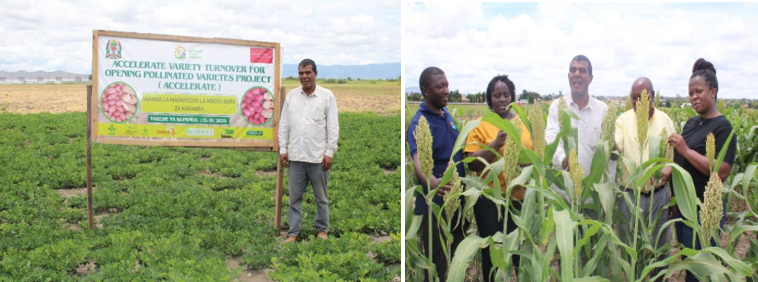
Accelerate project team visiting sorghum and groundnut demonstration plots hosted by KFS at Kibaigwa in Kongwa Districts.
Photo credit: CIAT/PABRA
The demonstration plots, prominently labeled with posters displaying the names of planted varieties and their planting dates, became a focal point of interest. Located near Dodoma-Morogoro Road in the KFS area, these plots drew a diverse audience, including local leaders. Among them was Kongwa Constituency Parliamentarian Job Ndugai, who visited KFS to explore the new and improved sorghum and groundnut varieties showcased.
Impressed by the initiative, Ndugai commended KFS for promoting advanced farming practices. KFS not only introduced new crop varieties but also ensured a stable market for farmers’ produce and supported them with credit for seeds, particularly during the crucial planting season when funds are often limited.
Conducting farmers’ field days
On May 17, 2024, KFS hosted a farmers’ field day at the sorghum and groundnut demonstration plots in Kibaigwa village, Kongwa District. The event drew 105 farmers and numerous stakeholders who witnessed the remarkable performance of the TARI SOR 1, TARI SOR 2, NARINUT 2015, and NALIENDELE 2016 seeds. Farmers highlighted their previous lack of awareness about new varieties, which had resulted in lower yields and incomes.
The field day, therefore, significantly boosted their understanding of these new varieties, which promise higher production—boasting about 200 pods per plant for groundnuts, compared to only 30-35 pods in traditional varieties. Delighted with the performance of the new short-maturity and disease-resistant varieties, KFS took proactive steps to ensure a sustainable seed supply for the next season. As a result, the company ordered an additional 300 kg of TARI SOR 1 and TARI SOR 2 seeds, which were planted near the KFS premises. Additionally, KFS is organizing the Kibaigwa Agribusiness Expo 2024 in collaboration with the East African Grain Council (EAGC) and other stakeholders, providing land and irrigation infrastructure to promote various crop seeds.
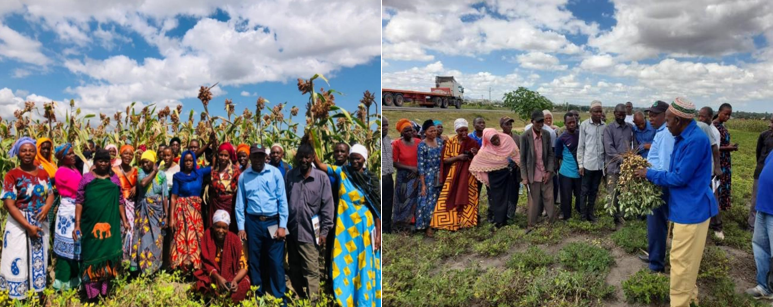
Farmers’ field day conducted by KFS at the groundnuts and sorghum demonstration plots near its premises in Kibaigwa village, Kongwa District.
Photo credit: CIAT/PABRA
Providing extension services to farmers
For continued engagement with farmers and as a way of keeping them abreast of new farming techniques, KFS developed a communication strategy. Currently, according to Msola, his company is reaching out to lead farmers via ordinary calls or text messages, who then relay the information to fellow group members. However, due to the rural setting and often poor connectivity, timely communication can be challenging, leading to delays. Recognizing this issue, the Accelerate project initiatives have prompted KFS to start identifying farmers with smartphones within the multistakeholder platform (MSP) network. These smartphones will be instrumental in establishing a digital platform, specifically a WhatsApp group.
This is aimed at revolutionizing communication between KFS and the farmers, in turn enhancing interaction, while providing crucial advisory services within the MSP led by KFS. Moreover, it will connect farmers with various service providers and inform them about cutting-edge technologies vital for farming.
Supporting Quality Declared Seed (QDS) production to enhance seed access
KFS is thrilled with the remarkable performance of the newly introduced sorghum and groundnut varieties showcased in the demonstration plots. This enthusiasm is shared by both the group and individual farmers who participated in the demos. To ensure a sustainable supply of quality seeds, KFS is empowering an initial cohort of 20 farmers to produce seeds that meet Quality Declared Seed (QDS) standards for groundnut and sorghum. KFS will purchase these seeds and lend them to other farmers to produce grain, which KFS will also buy.
In collaboration with the Accelerate Project, KFS organized an intensive training session on 20-21 June, 2024, for these 20 farmers (8 men and 12 women), focusing on QDS seed production for sorghum and groundnuts. Demonstrating its commitment to strengthening seed systems and expanding its business, KFS covered over 40% of the training costs. The training also attracted three sorghum traders from Mpwapwa and Kongwa districts, eager to learn about QDS seed production.
Representatives from NMB Bank attended the training to brief participants on their agricultural credit products and discuss potential financial models with the KFS and Accelerate Project teams from TARI and TOSCI. As a result, 16 participants opened bank accounts with NMB, fulfilling one of the prerequisite conditions to access credit.
This initiative not only enhances seed quality and availability but also fosters a robust support network for farmers, ensuring a bright future for sorghum and groundnut production in the region.
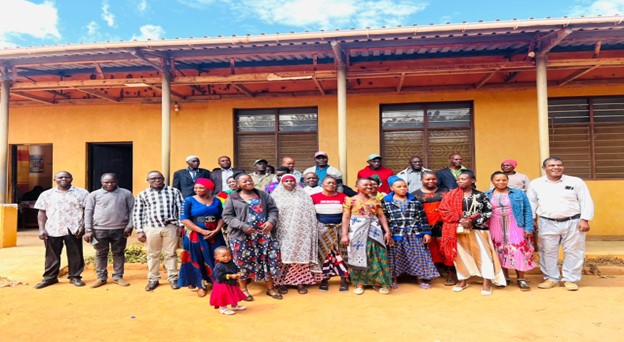
Farmers and traders pose for a group photo at the end of a QDS production training in Kongwa District, Dodoma region.
Photo credit: KFS/TARI
Table 3: Number of Demos, Quantity of Seed Purchased and Number of Farmers Capacitated on Quality Declared Seed Production.
|
Category |
Details |
|
Number of demos |
16 Demos (Sorghum: 11, Groundnuts: 5) |
|
Number of QDS |
20 (8men, 12 women) 3 Traders (3 men) |
|
Seed purchased (kg) Seeds supported (kg) |
150 kg 150 kg |
Enhanced partnerships for upgrading of sorghum and groundnut value chains
Working with the Accelerate Project has significantly benefited KFS in various ways, including facilitating partnerships with other stakeholders. Recently, KFS entered into an agreement with A-Z Company Limited through AgroZ, with support from the Accelerate Project. The Accelerate Project team brokered partnership between KFS and AgroZ, focusing on upgrading the sorghum value chain. These discussions explored potential business collaborations, centred on a partnership where KFS would supply sorghum to AgroZ company. AgroZ would then use this sorghum to produce Aflasafe, a product that combats aflatoxin contamination in crops, and supply it back to KFS. This discussion concluded in a successful agreement between the two companies. This partnership offers mutual benefits. For KFS, access to Aflasafe will enable the production of aflatoxin-free sorghum, which is appealing to premium markets willing to pay higher prices, particularly in regions like Rwanda. For AgroZ, the consistent supply of sorghum from KFS will ensure steady production of Aflasafe, thereby enhancing AgroZ’s market reach and impact. This initiative not only promises to boost production and profitability but also contributes to food safety and security in the region.
Conclusion
The Accelerate Initiative marks a pivotal moment for farmers in the region, as they transition from relying on old, less productive varieties to embracing innovative, high-yielding crops that can transform their livelihoods. Furthermore, KFS’s involvement in this endeavour demonstrates the crucial role that traders play in strengthening seed systems and accelerating varietal turnover, especially for sorghum and groundnuts in Tanzania. Through strategic engagement and innovative approaches, KFS significantly impacts the agricultural landscape. The introduction of better performing sorghum and groundnuts varieties to the farmers who were growing very old varieties which have limited performance in terms of yield, resistance to pest and diseases and climate change, provides smallholder farmers with a reliable market by purchasing crops at competitive prices and engaging them in contract farming. This includes supplying seeds on credit and offering training in good agricultural practices (GAP), which ensures a steady supply of quality grains for KFS while empowering farmers to enhance their yield and profitability. Additionally, KFS supports the production of quality declared seeds (QDS) seeds for sorghum and groundnuts, ensuring a consistent supply of high-quality seeds essential for boosting agricultural productivity and strengthening the seed system further. Partnerships with stakeholders, such as A-Z Company Limited, underscore the critical role of traders in accelerating the adoption of improved agricultural technologies and practices across the value chains.

